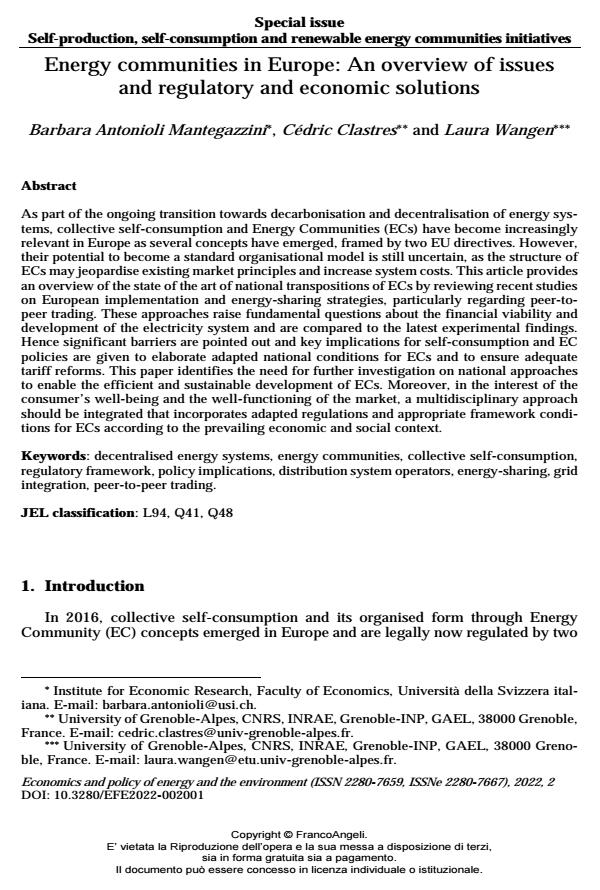Energy communities in Europe: An overview of issues and regulatory and economic solutions
Titolo Rivista ECONOMICS AND POLICY OF ENERGY AND THE ENVIRONMENT
Autori/Curatori Barbara Antonioli Mantegazzini, Cédric Clastres, Laura Wangen
Anno di pubblicazione 2023 Fascicolo 2022/2
Lingua Inglese Numero pagine 19 P. 5-23 Dimensione file 186 KB
DOI 10.3280/EFE2022-002001
Il DOI è il codice a barre della proprietà intellettuale: per saperne di più
clicca qui
Qui sotto puoi vedere in anteprima la prima pagina di questo articolo.
Se questo articolo ti interessa, lo puoi acquistare (e scaricare in formato pdf) seguendo le facili indicazioni per acquistare il download credit. Acquista Download Credits per scaricare questo Articolo in formato PDF

FrancoAngeli è membro della Publishers International Linking Association, Inc (PILA), associazione indipendente e non profit per facilitare (attraverso i servizi tecnologici implementati da CrossRef.org) l’accesso degli studiosi ai contenuti digitali nelle pubblicazioni professionali e scientifiche.
As part of the ongoing transition towards decarbonisation and decentralisation of energy systems, collective self-consumption and Energy Communities (ECs) have become increasingly relevant in Europe as several concepts have emerged, framed by two EU directives. However, their potential to become a standard organisational model is still uncertain, as the structure of ECs may jeopardise existing market principles and increase system costs. This article provides an overview of the state of the art of national transpositions of ECs by reviewing recent studies on European implementation and energy-sharing strategies, particularly regarding peer-topeer trading. These approaches raise fundamental questions about the financial viability and development of the electricity system and are compared to the latest experimental findings. Hence significant barriers are pointed out and key implications for self-consumption and EC policies are given to elaborate adapted national conditions for ECs and to ensure adequate tariff reforms. This paper identifies the need for further investigation on national approaches to enable the efficient and sustainable development of ECs. Moreover, in the interest of the consumer’s well-being and the well-functioning of the market, a multidisciplinary approach should be integrated that incorporates adapted regulations and appropriate framework conditions for ECs according to the prevailing economic and social context.
Parole chiave:decentralised energy systems, energy communities, collective self-consumption, regulatory framework, policy implications, distribution system operators, energy-sharing, grid integration, peer-to-peer trading.
Jel codes:L94, Q41, Q48
- A Review on Energy Communities Development, Opportunities and Challenges in Germany, Spain, and Italy Saeed Khorrami, Maria Carmen Falvo, Massimo Pompili, in IEEE Access /2025 pp.103385
DOI: 10.1109/ACCESS.2025.3579336
Barbara Antonioli Mantegazzini, Cédric Clastres, Laura Wangen, Energy communities in Europe: An overview of issues and regulatory and economic solutions in "ECONOMICS AND POLICY OF ENERGY AND THE ENVIRONMENT" 2/2022, pp 5-23, DOI: 10.3280/EFE2022-002001